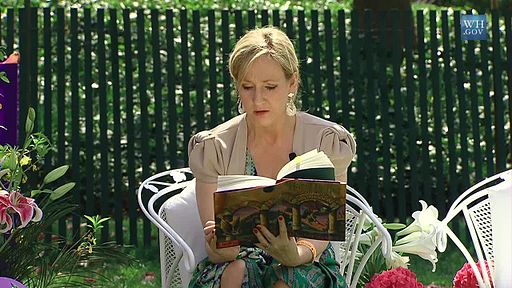Working Words Through the Body
Aaron Guest
 I worked a number of positions in television news, and the only aspect of it I really enjoyed was the news writing. The experience taught me a great deal about the kind of writer I wanted to be. And until recently, I’d forgotten I’d wanted to be the kind of writer whose stories are read aloud. There’s a power in telling stories for all to hear.
I worked a number of positions in television news, and the only aspect of it I really enjoyed was the news writing. The experience taught me a great deal about the kind of writer I wanted to be. And until recently, I’d forgotten I’d wanted to be the kind of writer whose stories are read aloud. There’s a power in telling stories for all to hear.
While I’d been able to read aloud The Wonderful Wizard of Oz, My Side of the Mountain, even Beowulf and the Aeneid to our kids, it hadn’t become a regular practice. This past Christmas we received the new illustrated Harry Potter and I thought, “What the hell, they’re old enough.” So I started reading it to the two oldest kids. I figured they’d be awed from the start. They weren’t.
One of the habits of being a news writer was to read out loud everything you wrote. It helped if you were able to mimic, to some degree, the anchors who would read the story. And while I wasn’t great at completely aping the sound of their voices, I could get the cadences down, I could wager where they’d be likely to pause, speed up, or slow down. It made me a better writer to understand how my anchors would speak.
And so after the first chapter of the first Harry Potter books fell flat, I realized I needed to become a better reader. These characters had incredible voices. So I began to use them. Harry’s was, obviously, a proper Cockney; Vernon Dursley’s weight and anger meant his whole body should shake when he speaks from the back of his throat; Dudley whines. Hermione has a slightly pressured speech; Ron is quite certainly from Boston. It’s been an enormous success, even if I’ve had to adopt upwards of twenty distinct voices as we’ve progressed through six books. (My favorites are Dumbledore’s Scottish drawl and Ginny’s Irish lilt.)
Gina Ochsner has written a marvelous novel called The Hidden Letters of Velta B. I implore you to read it. The main character, Inara, narrates the stories of her life to her son while on her deathbed. Ochsner’s brilliant writing absorbs the euphony of oral story-telling. The voice of Inara is so sublime that you’ll find the words tumbling out of your mouth in an empty room at 1am.
Inara believes inviolably in the telling of stories out loud because in this way we can “bury them deeply and firmly, pushing them down to an unshakeable foundation, a bedrock of truth.” And on this we can begin to build, to connect to each other in new ways. My experience in reading to the kids has had this effect. I’m often called upon to do one of the voices while making dinner, giving baths, saying goodnight. These stories, heard aloud, have come alive. For example, my son mimics well my voice for Luna Lovegood. During a theater class he used the voice to perform a short monologue. Based on the way I’ve read Luna’s character it fit perfectly into the character he assumed.
But I have questioned the effect of my reading efforts. Have I somehow warped the story to my own whimsical adaptations? Or prevented them from fully grasping the weight of it? They did not respond to a main character’s death with any emotion (I even read it during the day so they wouldn’t fall asleep heartbroken!) And what about when I read these books again and I do some of the voices differently?
Inara’s son Maris questions the logic of verbal story-telling. Here’s how Inara responds:
If you stand in a river you will never feel the same water touch you twice. A story is never told exactly the same way… The words work on us differently each time we hear them…As familiar as they are, they will never grow old. We stand in those familiar waters and feel ourselves transformed anew. This is the power of word worked through the body.
This is why we must tell our stories.
I know that reading Harry Potter through out loud this time has worked such an exact magic over me. It’s an altered experience to dart around the room reading about when Harry wins the Quidditch Cup. To shake and growl out Hagrid’s bellowing because his spider has died. Or to work Harry’s anger toward Dumbledore through my jaw. To squeak out Neville’s bravery in book one and know what happens in book seven.
There is a transformative energy that come with sending words up and out through the body, whether they are your own or someone else’s. And even though my youngest daughter often comes into the room to tell me I’m being too loud and she can’t sleep, I can’t ignore the refrain of Inara’s dying exhortation: “Let us baptize our world in words.”